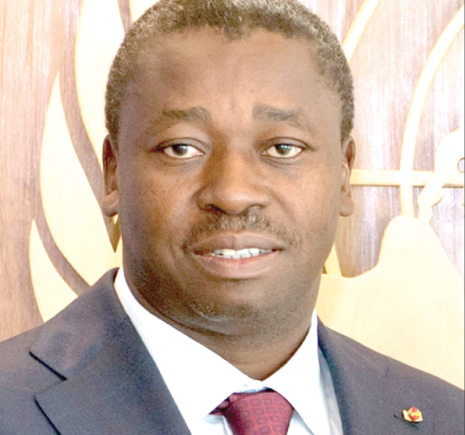
Togo’s constitutional change: ECOWAS must act now
Current political developments in Togo make it imperative for all countries in the West Africa sub-region to stay alert. Togo which hitherto practised a semi-quasi presidential system of government will now no longer elect its presidents.
This follows a March 25 adoption of a new constitution by lawmakers of Togo’s legislature, the national assembly, which changes the country’s system of government from presidential to parliamentary.
According to various international media reports, there were initial backlash from Togo’s opposition following the adoption of the reforms for which reason President Faure Gnassingbé called for further consultations on it as well as a second parliamentary vote.
These done, the president has since signed the new constitution. The new constitution, was introduced by members of the ruling UNIR party, who formed the majority in parliament.
Under this new parliamentary system of government, Togo’s presidents will no longer be elected through universal suffrage, rather, lawmakers of Togo's national assembly will choose the president.
According to a report by Associated Press, the new constitution also increases presidential terms from five to six years and introduces a single-term limit but the nearly 20 years that Faure Gnassingbé had served in office would not count. As head of state, this president performs only ceremonial functions.
The new constitution further introduced the position of president of the council of ministers, who in some jurisdictions is referred to as the Prime Minister, but in Togo will have full authority and power to run government affairs.
The president of the council of ministers would either be the leader of the party which gets the majority seats in Parliament or the leader of the winning coalition of the party.
Several reasons had been assigned to this new change in the constitution including the fact that it would strengthen democracy by allowing more people to participate in governance.
Opposition reaction
Obviously, this change in the constitution did not go down well with Togo's opposition and some civil society organisations with the former describing it as a constitutional coup. “What happened at the National Assembly is a coup d’etat,” reports Aljazeera, quoting a statement from the opposition coalition, Dynamique Pour la Majorité du Peuple (DMP).
One of the main concerns raised by the opposition against the new system was that it would allow Faure Gnassingbé to prolong his stay in office. Faure’s tenure ends in 2025 but considering the fact that his party has the majority seats in parliament, the party could decide to elect him as the president of the council of ministers under the new constitution. This will mean that he would remain in office for another six years or beyond depending on his party.
The concerns of the opposition are well placed considering the fact that the Gnassingbé family has ruled the country for the past 57 years. Faure’s father, Gnassingbé Eyadéma, who was his predecessor, came to power in 1967 and remained there until 2005 when he died. Faure succeeded him as president in 2005. Definitely, the thirst for change is something majority of the people were looking up to now.
Dr Ateku
Following the reforms in the constitution, some have argued whether the transition from presidential to parliamentary system of government was necessary. Well, speaking to an International Relations lecturer at the university of Ghana, Dr Abdul-Jalilu Ateku, on the subject, he said “it depends”, explaining that both the parliamentary and presidential system of government have their advantages and disadvantages. In the case of Togo’s new constitution, he added, there would be greater interest in the activities of parliament because whichever party wins would form the government.
There have also been the argument that the new reform could create conflict or result in split executive. But Dr Ateku said although previously, such conflicts existed for countries that adopted that system of government, presently, most countries using the parliamentary system of government have developed their constitutions such that clarities exist — the roles have been clearly defined. He said in the case of Togo’s new constitution, that clarity also existed. “The president will perform ceremonial role, so virtually he wields no power. The president of the council of ministers is the one tasked with the running of the actual business of government and of the state,” he said.
Extension of rule
On whether the concerns raised by the opposition to the effect that the new constitution would cause Faure to extend his stay in office, Dr Ateku said it depended on the cards that Faure would decide to play. He explained that if Faure wanted to leave political office gradually, he might not be interested in becoming president of the council of ministers and perhaps, opt for the president.
However, if he wanted to maintain his family’s grip on power, he might decide to accept his election as the president of the council of ministers.
On the way forward, he pointed out that it was important for Togo’s opposition to come together to form a strong coalition, if indeed they wanted to ascend to power.
“If they will be effective and relevant then coming together will be better than being fragmented,” stated Dr Ateku.
ECOWAS
Sub-regional body, ECOWAS should also speak at this crucial time on what is going on in Togo. Although, the change in the constitution was done through parliament, thereby legitimising it, it is a clear sign of abuse of incumbency and ECOWAS must condemn it.
It is some of these things that lead to protests and civil unrest, which had already started in Togo, and eventually to coup d’etats. At this particular time that what is happening is bad, ECOWAS must intervene and call President Faure Gnassingbé as well as Togo’s lawmakers to order. Otherwise, when the unfortunate happens, they should not condemn anybody.
